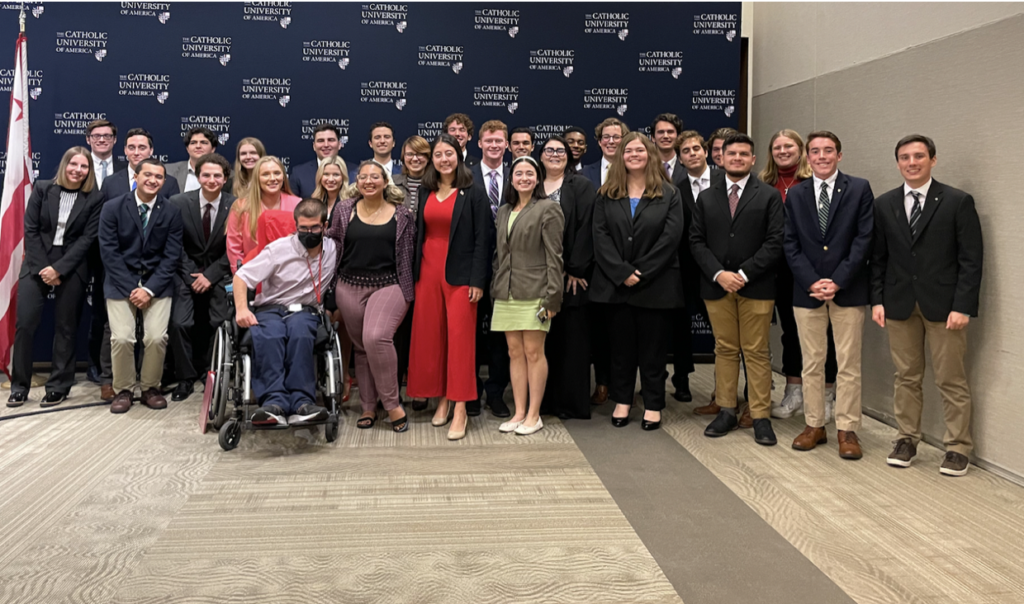Senate Back at Work: Two Resolutions and a Bill Passed

Image Courtesy of The Catholic University of America
By Chanel Cole
Another senate meeting took place on March 13, 2023 in the Pryz Great Rooms.
VP Fahey invited Provost Aaron Dominguez as the next University administrator in the Senate Speaker Series. He spoke about his almost seven years at Catholic and what originally brought him here. A devoted physicist, he explained that the opportunity to integrate his faith and science was the unique aspect of Catholic University that attracted him to work here.
After a description of other positions he’s taken prior to Provost, he opened up a segment for questions from senators. Followed by a question from Senator Curioso about time management, Senator Kish asked Provost Dominguez what would have to be done to maintain the university’s Catholic identity. The provost explained that this was an important goal of his and that he does so by hiring faculty that are both excellent within their field and want to further that mission to uphold the Catholic identity.
Senator Foley then asked how the university expected to maintain its academic rigor and the provost answered that becoming a research one institution is crucial towards that goal. After this, Senator D’Attelo raised a question about the biggest challenges to expanding enrollment as President Kilpatrick hopes. The provost replied stating that the university is trying new strategies to expand enrollment, including unifying different departments of enrollment, focusing more attention on recruiting Master’s students, and looking into India for prospective students. Wrapping up, Senator Bommer asked the provost the last question regarding how students and SGA can get involved in the initiative to make the university a top research institution. The provost answered by stating that the more students are proactively participating in research on or outside of campus, the better.
Following a round of applause for Provost Dominguez, the committee chairs presented updates to the senate. VP Fahey then turned the senate’s attention to the first legislation of the night, Resolution 031.
Resolution 031 sought to expand the Kane Fitness Center’s hours. Sponsored by Senator Downing and co-sponsored by Senators Curioso and Suarez, the resolution states that due to the fact that about 20% of the student population are student-athletes and that the current hours are inconvenient for some students, Kane’s opening hours should be extended to address those concerns. Senator Downing explained that before the pandemic hit, a pilot program had the center open three hours longer on weekends; however, this program came to an end because of the COVID outbreak. He met with Director of Campus Services Timothy Carney and Assistant Director of Fitness and Recreational Sports, Jess Murtagh; Downing said they both approved of the idea, but because of budgetary constraints, could not enact the resolution’s plan.
Preceding this introduction to the resolution, senators had the opportunity to ask questions, first of which was Senator Besendorfer asking how the sponsor planned to encourage budget changes. She stated that last year, she worked on a similar resolution and ran into budgetary issues and was therefore curious as to how Senator Downing would approach the issue. In response to this, he stated that the passage of the resolution would be a step in the right direction because it will bring the issue to the attention of university administrators. Senator Bommer had research questions relating to what hours and programs other universities’ fitness centers have and Senator Downing provided him those answers. Next, Senator Kruger praised the sponsor for the resolution. This was followed by Senator D’Atelo asking for insight on whether or not the administrators Downing met with were open to the idea, to which he responded that they were.
Upon the conclusion of the debate, a vote was taken and the resolution passed unanimously.
The next item of the agenda, Resolution 032, sponsored by Senator Drauschak and co-sponsored by Senators Bommer, Bubel and Kish, sought to designate the Old Soldier’s Golf Course as the practice site for CUA’s men’s and women’s golf teams. The golf teams currently practice on UMD’s course, but because of the inconvenience of its location, the resolution wants to revive an old partnership with the Armed Forces Retirement Home so that the teams could use its golf course. According to Drauschak, the CUA golf teams had a partnership with the retirement home in the past years, but because of student negligence, that partnership came to an end.
The reason why he proposed to reestablish the partnership is because the golf course is closer to the university and therefore more accessible for students. Furthermore, overlooking the course is a view of the Washington Monument, a spectacle that could be enticing for future recruited golf students. With this, the resolution calls for all undergraduate students to have access to the golf course, agreeing that any student that violates any rules or regulations of the golf course would be banned. The golf teams would also have exclusive access to the course under an agreed fee. Senator Drauschak shared his additional ideas of setting up volunteer opportunities at the Retirement Home. After he finished his introduction, VP Fahey asked Senator Bommer to return to his seat to rest the Cardinal teddy bear he was holding.
First to ask questions was Senator Curioso, who wanted to know how students would be transported, to which the resolution sponsor proposed the idea of setting up a shuttle system and finding a way to keep track of who goes. Next, Senator Besendorfer rose to praise the resolution. This was followed by Senator Musick asking if there were any reasons that the university administration would be opposed to enacting the resolution, to which Senator Drauschak replied that it was unlikely. Finally, Senator Gehrig asked if graduate students were allowed to get involved and the sponsor stated that both graduate students and faculty members could possibly get involved. This was followed by a roll call vote and the resolution passed unanimously.
The last legislation of the night was Bill 005, sponsored by Senator Musick and co-sponsored by Senators Besendorfer, Curioso, Henriquez and Kruger. The bill pertains to the president of the senate’s power to set the agenda for meetings. It proposed that if the president of the senate decides to withhold legislation, he or she must send an email notification to the entire senate, along with an explanation behind the decision before the next senate meeting.
Bill sponsor Senator Musick stated that her goal with the bill was to ensure fair practice within the SGA senate and establish a system of checks and balances on the powers of the president of the senate. She stated that the bill was not aimed at one person and that the check would be beneficial to the student body. Because legislation can be blocked without debate, Senator Musick stated that it discourages discussion. Furthermore, the bill proposes that the president of the senate can adopt a motion to vote on bringing the withheld legislation to the floor and if the vote gains a ⅔ majority of senate approval, then the legislation can be discussed and voted on. Co-sponsor Senator Curioso praised the resolution, stating that the senate would be adhering to the same principles the Founding Fathers had in mind when they drafted the Constitution. Following this sentiment, Senator Besendorfer stated that this was not the first time that the idea behind Bill 005 was brought to the senate’s attention; it was also brought to the senate’s attention in her freshman year. Besendorfer clarified that the bill would not remove the president of the senate’s power to draft the agenda of meetings, but would simply place a check on that power. She also explained that the bill was not a personal attack nor an isolated incident: problems with this issue arose in senates 4, 5, and 6 as well; Besendorfer continued that the bill would only serve to fix an issue that will continue to occur. Co-sponsors Senator Kruger and Henriquez echoed what the other senators had already said.
When the bill was sent to the floor for debate, Senator Martin was first to speak. She stated that while she did not support Senator Michel’s resolution, she did not expect for it to be blocked from the agenda and she still believed that it should have been debated. Martin then spoke to the merits of constructive debate in the senate.
Senator Tamayo expressed his concerns regarding the bill, reminding the senate that the VP was sworn in to represent the student body and suggested that he or she speak to the sponsor of the legislation in question. In response, Senator Musick stated that she disagreed with his statement and stated that the bill did not only concern the Vice President, but also the Senate Pro Tempore in the event that the VP cannot run the senate. She also stated that the executive ran unopposed and because current freshmen did not get to vote, the executive is not representative of the entire undergraduate population. Senator Besendorfer also reiterated that the bill would not strip any powers away from the president of the senate.
Senator Michels rose to state that a supermajority would be required to override the decision to withhold legislation and that the passage of the bill would further encourage debate, to which bill sponsor Musick agreed.
Next, Senator Foley stated that he was worried about the direction of the senate, concerned that the bill will create division. He proposed that the senate work together with the executive to figure things out, and that compromise would be the right way to solve the bill’s core issue.
Senator Musick responded that she agreed to disagree, asserting that the senate is not political, nor an official U.S. form of government. She also stated that more division would be seen if this bill wasn’t passed because of a lack of transparency. Musick said that there was no precedent of meeting with the executive to discuss bills, at least not for this year, and she felt there was no need for a meeting. Senator Besendorfer also echoed those sentiments, adding that she would never want any senator to be unprepared before the senate because of a last-minute change to the agenda.
Again, Senator Foley rose, stating that it was not in the bylaws that the president of the senate had to be transparent with the entire senate about blocking a legislation and that if a legislation gets blocked, it’s usually no secret to most senators.
Responding to this, Senator Musick stated that things may get lost in translation and that the best way to prevent confusion is through an email from the president of the senate with an explanation. She added that not everyone is always going to be on the same page if news is shared through word-of-mouth. Before she could finish, Senator Musick stopped to ask Senator Foley to stop talking while she was speaking. VP Fahey then interjected, stating it was against decorum.
With the time running down and VP Fahey banning what would be a fourth extension to the debate, Senator Kish got some final words in. He stated that it seemed to him that the rules were changing because they didn’t like that they lost. To him, the bill’s intention seemed like an attempt to get back at the VP for blocking Senator Michel’s resolution last month.
In the last seconds, Senator Musick responded by stating that Kish had misquoted her and before she could get much else in, the timer signifying the end of the debate sounded. Senator Besenforder asked for another extension because there were other senators ready to raise questions and concerns, but the VP refused to consent. A roll call vote then took place and the resolution passed with 16 senators in favor and 8 against.
In her VP updates, Fahey took the time to explain the role of the SGA Vice President. There are two main roles: acting as an advocacy arm alongside the SGA President and overseeing the senate and agenda based upon content fit to improve the student body and advance the mission of the student senate. She explained that vice presidents have blocked legislation for several years, not for spite, but because they believed in maintaining the quality of legislation discussed in the senate. She provided an example of a resolution that was blocked a few senates ago, but would have received widespread support: free metrocards for students. Pivoting from that, VP Fahey asserted that her role required her to make hard decisions for the student body and that students trust her to make these decisions because they voted for her. She lamented that during the debacle of her blocking Senator Michel’s resolution, she was recovering from surgery and the flu; Fahey stated that despite her condition, she received no mercy nor grace when she had to make that hard decision. According to her, it was at that moment that she realized that her fellow senators did not see her as a person, but rather just a member of the senate. She stated that the answer to the larger question at hand was not to take power away from the Vice President because of some disagreement.
Transitioning from this, an open floor was initiated and Senators Kruger, Gehrig, Drauschak, Curioso, and Besendorfer rose to speak. Additionally, Senator Musick thanked the Vice President for not withholding her bill. She stated that her goal upon entering the senate was to represent the views of her constituents, not adhere to administration; she wanted to make sure that students outside the senate have a voice, stating that according to a poll conducted by CUA polls, 68% of students agreed with the passage of her bill. With that, the meeting came to an end.
The day following this meeting, SGA President Tony Crnkovich vetoed the bill and sent a letter to the entire senate, explaining his decision.





